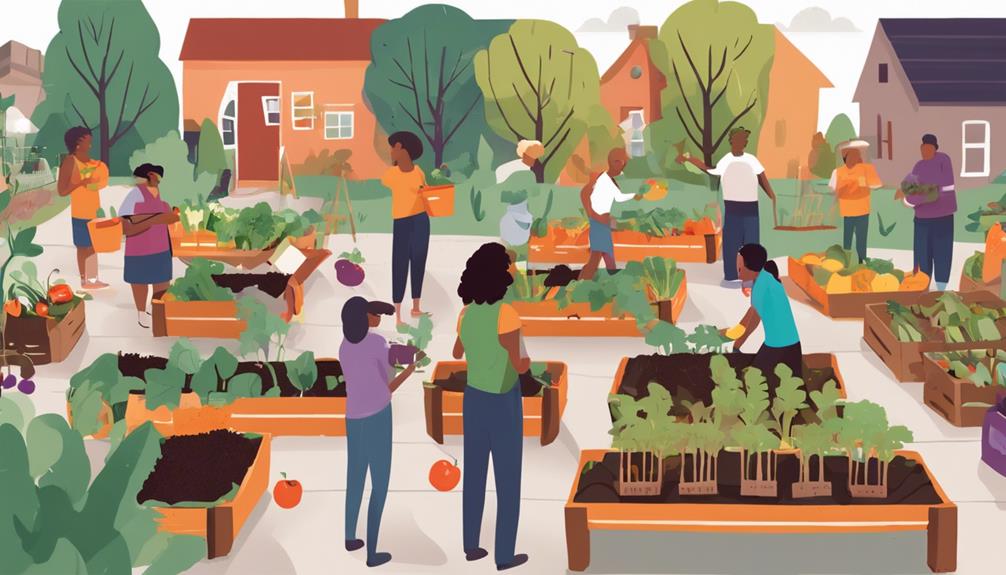What Is the Link Between Eco-Friendly Food and Waste Management?
Understanding the connection between eco-friendly food and waste management is crucial. Opting for organic food not only provides a boost in nutrients but also decreases exposure to harmful substances. Embracing farm-to-table practices supports local economies and sustainable agriculture. Composting reduces methane emissions and enriches soil health. Reducing packaging waste through reusable and biodegradable materials contributes to a circular economy. By actively engaging in these practices, you can play a pivotal role in promoting sustainability and environmental well-being. Additional insights into the benefits and impacts of these choices await.
Benefits of Organic Food
Organic food offers a range of benefits that extend beyond just being free of synthetic pesticides and chemicals. When it comes to health benefits, organic food is packed with nutrients such as antioxidants, vitamins, and minerals. Studies have shown that organic fruits and vegetables contain higher levels of these beneficial nutrients compared to conventionally grown produce. By consuming organic food, you aren't only reducing your exposure to harmful chemicals but also increasing your intake of essential nutrients that are crucial for overall health and well-being.
Moreover, the environmental impact of organic food production is significant. Organic farming practices promote soil health by fostering biodiversity and reducing soil erosion. By avoiding synthetic pesticides and fertilizers, organic farming helps prevent water contamination and promotes water conservation. The use of natural fertilizers and crop rotation in organic farming also aids in maintaining soil fertility over the long term. Additionally, organic farming methods produce lower greenhouse gas emissions compared to conventional agriculture, contributing to mitigating climate change.
Impact of Food Waste
Considering the vast quantities of food wasted globally each year, it's imperative to address the significant impact of food waste on both the environment and society. Food waste impacts various aspects of our lives, from the resources consumed in production to the consequences of disposal. Here's a breakdown of the key impacts:
- Environmental Degradation: Food waste contributes to greenhouse gas emissions as it decomposes in landfills, releasing methane—a potent greenhouse gas. Additionally, the resources used in food production, such as water, energy, and land, are wasted when food isn't consumed.
- Economic Loss: The financial implications of food waste are substantial, not only for consumers but also for businesses along the supply chain. When food is wasted, all the resources and costs associated with producing, transporting, and storing that food are essentially wasted as well.
- Social Consequences: Food waste exacerbates issues of food insecurity and hunger. By reducing waste, we could potentially redirect surplus food to those in need. Furthermore, it's essential to address consumer behavior and improve supply chain efficiencies to tackle the root causes of food waste effectively.
To mitigate the impact of food waste, interventions at various levels are necessary. Educating consumers about mindful consumption, optimizing supply chains to reduce waste, and implementing innovative technologies for food preservation and redistribution are crucial steps towards a more sustainable future.
Farm-to-Table Practices
Farm-to-table practices streamline the food supply chain, fostering transparency and sustainability from production to consumption. By prioritizing local sourcing and sustainable farming methods, this approach significantly reduces the environmental impact of food production and distribution. Local sourcing involves obtaining ingredients from nearby producers, cutting down on transportation emissions and supporting the local economy. Sustainable farming focuses on methods that protect the environment, such as crop rotation, natural pest control, and minimal chemical usage.
When restaurants and consumers embrace farm-to-table practices, they not only enjoy fresher and higher quality foods but also contribute to reducing carbon footprints. According to a study by the University of Michigan, sourcing ingredients locally can lead to a 17 times lower carbon footprint compared to those transported across the country. Additionally, sustainable farming practices help preserve biodiversity, soil health, and water quality, ensuring a healthier ecosystem for future generations.
To further promote farm-to-table practices, individuals can seek out restaurants and markets that prioritize local sourcing and sustainable farming. By supporting these establishments, you're actively participating in the movement towards a more environmentally friendly and sustainable food system. Making informed choices about where your food comes from can have a significant impact on reducing waste and promoting a healthier planet.
Composting for Sustainability
Utilizing composting as a sustainable waste management strategy can significantly reduce landfill waste and contribute to a healthier environment. Composting involves the decomposition of organic waste into nutrient-rich soil, which can then be used to enhance soil quality in sustainable agriculture practices.
Here are three key reasons why composting is essential for sustainability and minimizing environmental impact:
- Reduction of Methane Emissions: When organic waste is sent to landfills, it undergoes anaerobic decomposition, producing methane, a potent greenhouse gas. By composting organic waste instead, the aerobic decomposition process significantly reduces methane emissions, helping combat climate change.
- Soil Health Improvement: Compost adds valuable organic matter to the soil, enhancing its structure, water retention capacity, and nutrient content. This leads to improved soil fertility and promotes sustainable agriculture practices by reducing the need for chemical fertilizers.
- Waste Diversion: Composting diverts organic waste from landfills, where it would otherwise generate harmful leachate and contribute to soil and water contamination. By diverting this waste stream, composting helps reduce the strain on landfill capacities and minimizes the environmental impact of waste disposal.
Reduction of Packaging Waste
Transitioning from composting practices to address organic waste, the focus shifts to tackling the reduction of packaging waste to further enhance sustainability efforts.
Packaging waste is a significant environmental concern, with the food industry being one of the largest contributors. One effective solution to combat this issue is the adoption of reusable containers. By encouraging the use of reusable containers for packaging food products, significant reductions in single-use packaging waste can be achieved. Research indicates that a single reusable container can replace hundreds of disposable packages over its lifetime, making it a sustainable choice for both businesses and consumers.
Another key strategy in reducing packaging waste is the use of biodegradable packaging materials. Biodegradable packaging, made from materials that break down naturally over time, offers a more environmentally friendly alternative to traditional plastics. These materials can help reduce the amount of non-recyclable waste that ends up in landfills or oceans, minimizing the overall environmental impact of food packaging.
Circular Economy Approach
To maximize sustainability in food and waste management practices, implementing a circular economy approach is crucial for achieving long-term environmental benefits. By adopting a circular economy model, you can enhance resource efficiency and reduce waste generation significantly. Here are three key aspects to consider when implementing a circular economy approach:
- Resource Efficiency: Embracing a circular economy approach allows you to optimize the use of resources throughout the entire food production and waste management processes. By minimizing resource extraction and maximizing resource recovery and reuse, you can reduce the overall environmental impact of these activities.
- Closed Loop Systems: Implementing closed loop systems enables you to create a sustainable cycle where materials are used, recycled, and reused continuously. This approach helps in reducing the reliance on virgin resources, cutting down on waste generation, and promoting a more sustainable way of managing resources.
- Economic Benefits: Apart from the environmental advantages, a circular economy approach can also bring about economic benefits. By enhancing resource efficiency, businesses can save costs associated with raw materials, waste disposal, and energy consumption. This not only contributes to environmental preservation but also improves the bottom line of organizations.
Embracing a circular economy approach in food and waste management is a strategic way to promote sustainability, reduce environmental impact, and drive economic efficiency. By focusing on resource efficiency and closed loop systems, you can pave the way for a more sustainable and environmentally friendly future.
Community Food Sharing Initiatives

Enhancing community food sharing initiatives can significantly reduce food waste and improve access to nutritious food options for those in need. By fostering a sense of community and shared responsibility, these initiatives play a crucial role in addressing food security issues and promoting sustainability.
Urban gardens, as part of community food sharing initiatives, offer a practical solution to both reducing food waste and increasing access to fresh produce.
Studies have shown that community food sharing initiatives not only reduce food waste but also contribute to enhancing food security within neighborhoods. When surplus food is shared within the community, it ensures that edible food doesn't end up in landfills, thereby decreasing the environmental impact of food waste. Additionally, these initiatives help address food insecurity by providing nutritious options to individuals and families facing economic challenges.
Urban gardens, a common feature of community food sharing initiatives, allow communities to grow their own food locally. This not only promotes self-sufficiency but also reduces the carbon footprint associated with transporting food over long distances. By encouraging participation in urban gardening projects, communities can actively engage in sustainable practices that benefit both the environment and individuals' access to fresh, healthy food options.
Government Policies and Regulations
Government policies and regulations play a pivotal role in shaping the framework for sustainable food practices and waste management strategies. When it comes to eco-friendly food and waste management, the government's involvement is crucial in driving positive change. Here are three ways in which government policies and regulations impact these areas:
- Government Incentives: Implementing government incentives such as tax breaks or subsidies for businesses and individuals engaged in sustainable food practices can encourage more widespread adoption of eco-friendly initiatives. These incentives can offset the initial costs associated with transitioning to more sustainable food production and waste management processes.
- Waste Reduction Strategies: Through the implementation of regulations mandating waste reduction strategies, such as composting programs or limits on single-use plastics, governments can significantly reduce the environmental impact of food waste. By enforcing policies that promote waste reduction at both the consumer and producer levels, significant progress can be made towards a more sustainable future.
- Regulatory Framework: Establishing a comprehensive regulatory framework that sets clear guidelines for sustainable food production, packaging, and waste disposal is essential. This framework can ensure that businesses adhere to environmentally friendly practices and hold them accountable for their impact on the environment. By enforcing strict regulations, governments can create a level playing field for all players in the food industry and drive overall improvements in sustainability practices.
Conclusion
In conclusion, the link between eco-friendly food and waste management is clear. By opting for organic food, reducing food waste, implementing farm-to-table practices, composting, reducing packaging waste, adopting a circular economy approach, promoting community food sharing initiatives, and enforcing government policies and regulations, we can create a more sustainable food system.
These actions not only benefit the environment but also contribute to a healthier and more efficient food production and consumption cycle. It's time to prioritize eco-friendly practices for a better future.
